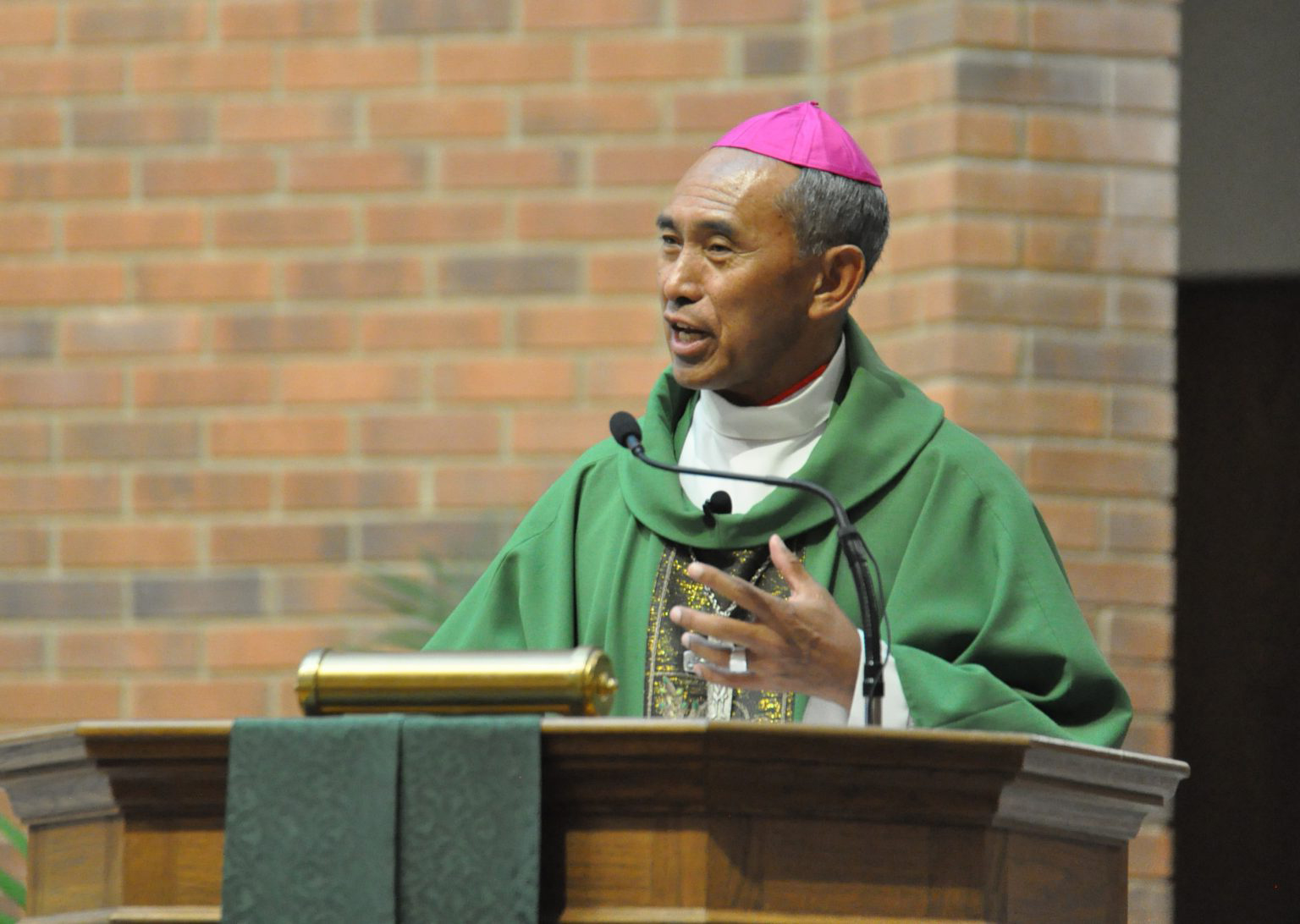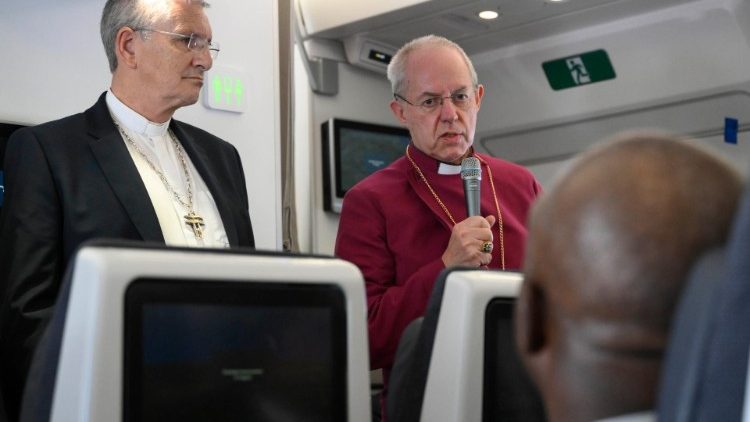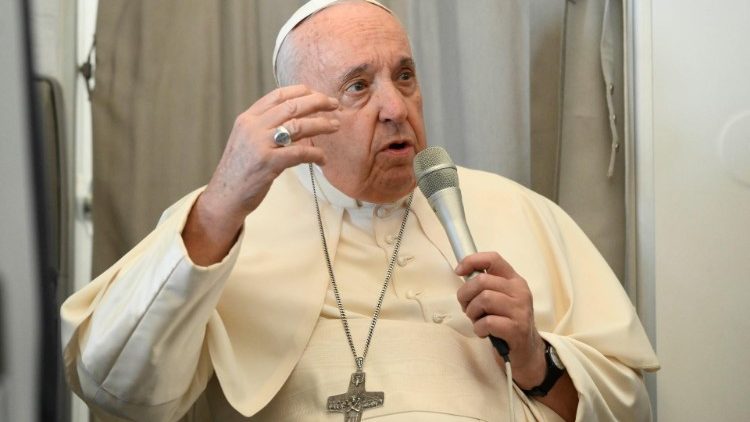A few thoughts for revitalizing FABC by Dr. Paul Hwang

Yangon, 26 February 2019, Posted by Joseph Win Hlaing Oo
As Myanmar Cardinal Charles Bo, a new president of FABC (Federation of Asian Bishops’ Conferences) will give a leadership of FABC from 2019, many people in Myanmar and in Asia are expecting new initiatives and new way of evangelization across the Asian Continent which is actually, the birthplace of Jesus Christ and is the birthplace of all religions in the world too.
No one will deny that FABC is passive and a weak institution in which many departments and secretary generals are also lacking pastoral zeal as well. Therefore Dr. Paul Hawng who is Director of Asian Lay Leaders (ALL) Forum, Joseph Win Hlaing Oo who is a founding rector of Joseph Education Institute (JEI) and Dr. Maung John who is a director of Lay Mission Institute, met the President of FABC, Cardinal Charles Bo at his Yangon residence on 12 February 2019 giving him the below thoughts for revitalizing FABC during his term.
- Future Direction of FABC Theology
Some 10 years ago Fr. Felix Wilfred had a dialogue with Fr. Michael Amaladoss, a worldly known Asian theologian especially on inculturation, in which the former asked the latter to change the theological term “inculturation” to “intercultural encounter” in theological discourse. It looks a simple asking but implies a lot of social and religio-cultural issues.
- “Inculturation” is the word which seems to remain still a dualism such as the church as subject and cultures as object. Ever since 1492 and 1521 when Columbus and Magellan “discovered” or “invaded” (from the perspective of people ‘discovered’) LA (San Salvador) and Asia (the Philippines) respectively, the peoples in the two continents “have lost” their language and were forced to think and talk in the colonizers’ language and grammar which were foreign, different from and even did not fit theirs.
- Therefore, “Modernity”, composed of Industrialism, Enlightenment and Christianity, is something the Western colonizers “experienced” on the one hand, and something the colonized will have to “achieve” (from the post-colonialism view point) on the other. However, that would never be achieved in the three continents including Africa as a historical fact. So, when it comes to FABC theology it should wrestle fundamentally with the issue of modernity by bringing the matters of “de-colonialism” or “post-colonialism” and “de-imperialism”. Based on the “theologies of pluralism” coming from real lives of peoples and “inter-cultural encounter” in Asia, it should “go public” going beyond “common good” which presupposes that we have something in common by not minding differences bet. classes in economic, cultural and social arenas.
- Also based on the past 50 years of Asian theologies, FABC theologies of Inculturation and interreligious dialogue should deal with history and phenomenon of de-colonialism as a critical response to post-colonialism and de-imperialism in Asia in an interdisciplinary manner.
- For doing so like Fr. Jojo Fung suggested before Fr. Felix Wilfred, the editor in chief of International Journal of Asian Christianity and Concilium, could lead its way to move forward supported by many “progressive” Asian theologians.
- Rethinking SCCs as FABC Ecclesiology
As we know the 5th PA of FABC declared SCCs as its official ecclesiology. But it has revealed its limitation to be confined within church wall. The concept of SCCs from South Africa, Lumko Institute to be exact, has indeed failed to adapt to many countries in Asia, the land of diversity, losing its “dynamism from below”, the very spirit of Vatican II. We need to revisit the current SCCs because we should revive such dynamism. We need diverse models of church with neighbors in mind no matter what model it would be. One model could be “Basic Human Communities” (BHCs).
- BHCs have been mentioned by Asian theologians and pastoral workers such as A. Pieris esp. in his book Fire and Water in 90s and Bishop Labayen in 70s who explored this BHCs model following Antioch model of church in Act 19-26 for the past 30 years. It went not without a strong lay formation called “YAPAK” (Following footstep of Jesus). We need various model of churches with relevant and consistent lay formation as such. (But YAPAK, unfortunately, had to stop due to lack of fund since 2008.)
- Considering the current parish-centered model of church prevailed in Asia, the role of parish could be a center while BHCs or SCCs as a Bible sharing group and other character communities could have “autonomous functions” but not without a connection with the parish as their center. Infanta diocese in the Philippines has kept going this kind of relationship though it has been weakened since the time of Bishop Labayen.
- Following Pope Francis’ Invitation to “Synodality” on FABC level
In 80s and 90s BISA, BIRA, BILA, BIMA and other “BIs” have been very active thanks to sincere and capable secretary generals like Fr. Desmond de Sousa from Goa, India who had led OHD at that time of Bishop Labayen supported by, Cardinal Stephan Kim, Cardinal Fumio Hamao, Bishop Bunluen Mansap and many other leaders in the church of Asia. Now is the time that we should revitalize this in a bit more “synodal” way.
Necessary reshuffling should be done and followed by a strategy-building steering meeting with the new and other officials of FABC: Through them it could organize Asian Institute for Social Action (AISA) done in the name of OHD in 70s-90s in a more collaborative manner. It includes not only bishops but priests, Religious and lay pastoral workers. Previously we had BISAs first and then proceeded to AISA and FEISA (Faith Encounters in Social Action) until mid. 90s in order to implement what we got from BISAs on the level of all the dioceses in Asia. But this time we could explore the spirit of “Synodality” or “walking together” in an Asian way. Why “Asian” here? What about it? By Asian way we meant a community-centered approach in which communion could and should be realized. That is more “synodal”, so churches from other continents would follow such Asian model. That is especially relevant when it comes to the “Kingdom approach” of FABC theology and its methodology specifically toward to “triple dialogue” with the poor, diverse cultures and great religious traditions in Asia.
The thing here is not the number of participants in the on-going program but those who want to follow “journeying together” on the diocesan level could be invited regardless how many participants would join. It is because they will be the seed or liven to yield multifold cultivation in the diocesan and national levels eventually.
- Regarding Complimentary Relation of FABC and ALL Forum: Suggestions from ALL Forum
- ALL Forum could be a part of FABC program
- Strength: FABC could support young lay leaders in pan-Asian level through the on-going programs of ALL Forum such as Asian Youth Academy (AYA)/ Asian Theology Forum (ATF) which has proved to its effectiveness and efficiency for the last 10 years and the “Moving School” which have been taking place in a country where more young people could have a similar program to AYA/ATF.
- FABC’s endorsement for ALL Forum’s pan-Asian programs
- Strength: ALL Forum will get fund easier for its all programs and FABC provide young lay leaders in pan-Asia with a regular and consistent formation program.
- FABC’s endorsement for ALL Forum’s programs in Myanmar alone
- Strength: ALL Forum and LAMIN could work together on regular basis
Written by Dr. Paul Hwang
Director of Asian Lay Leaders (ALL) Forum, Seoul, The Republic of Korea.
1952 Views









